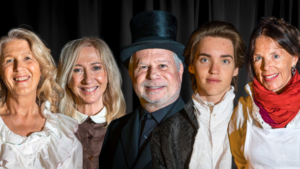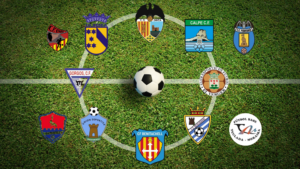Xàbia coach Miriam Monfort ready for anything with Valencian youth basketball team
The side finished sixth in the competition, the first that has been held since the pandemic took grip of the nation.
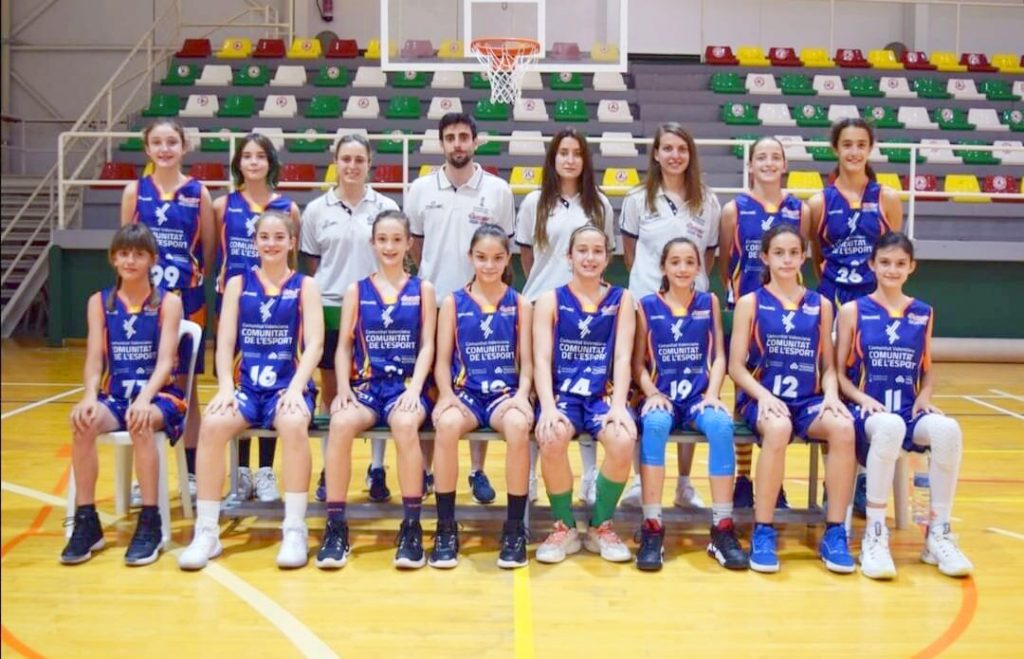
Monday 5th July 2021 – PRESS RELEASE with Mike Smith
The Spanish Mini Basketball Championship recently took place in Cádiz in which all the autonomous communities and cities came together (with the exception of the Pais Vasco) and, for the third year, this national competition once again has a presence from Xàbia, although not among the participating players but in the coaching staff.
Miriam Monfort, the basketball coach at CB Joventut Xàbia, joined the Valencian representative team, a role that she described as “gratifying and satisfactory for being able to participate in the first championship for these boys and girls“.
Miriam performs the functions of ‘assistant-delegate’ which, as she explained, in addition to the usual skills of a basketball coach, she contributes to ensuring that everything is planned so that, during training sessions and games, the players are comfortable and prepared for everything that happens off court, such as taking care of their diet, their equipment, rest periods and, in this edition, ensuring that they strictly comply with all the required health protocols. She also assists in the process of identifying future prospects from the Valencian grassroots and in the decision on the selection that will represent the Comunidad Valenciana.
Miriam’s participation is not arbitrary. Her experience as a basketball player and as a coach (some 12 years) make her well-known in both sectors as a defender of both grassroots and women’s sports.
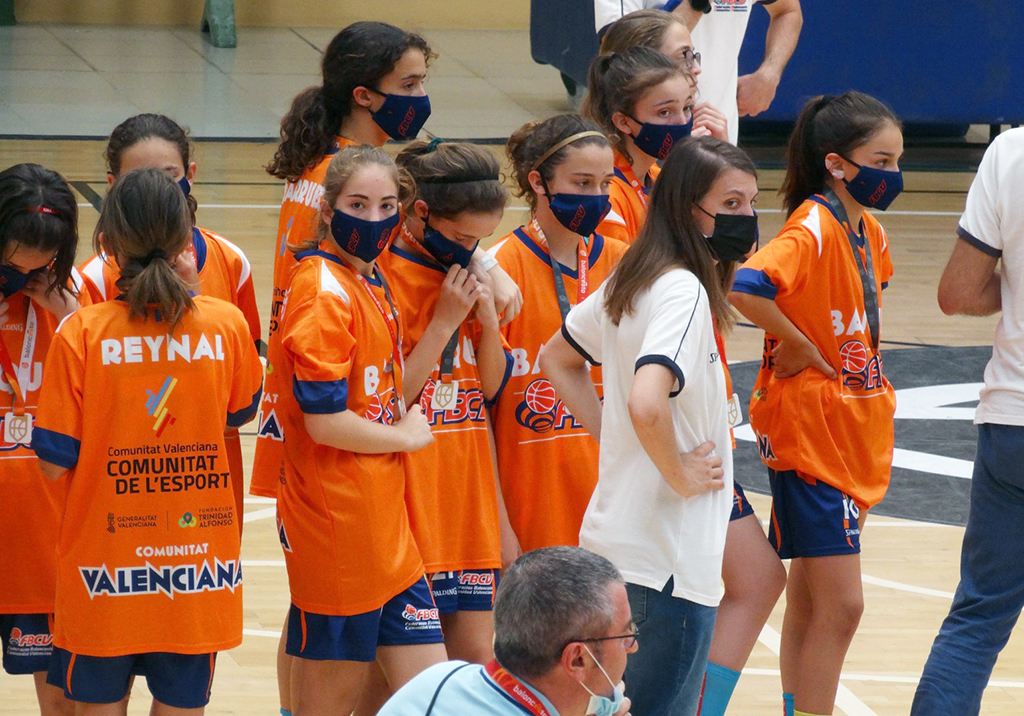
An express championship and marked by the pandemic
Miriam has told of the speed in the preparations this year in order to be able to bring together as competitive team for the championships. “Since the Spanish Federation gave the green light to the championship, there has been very little time compared to previous years“. Given the urgency, she explained that the profiles of players different from the usual were sought, those who had certain shooting skills and more grit on the court since it would speed up and make the process more functional given the reduced number of training sessions and matches that were going to be possible
The result was the re-adjust the work which would normally take four months into just two, which not only affected the Valencian side but all the regional sides since having had to suspend training and competitions for a few months, the young players have not been able to arrived at the championships with all the normal rhythm that their bodies can reach.
Regarding those measures implement to guarantee the protections of the team against COVID-19, she explained that the regulations have been scrupulously followed in each municipality in which the training has taken place.
In order to compete, coaches and players had to take up to four detection tests and if just one person tested positive, the rest of the squad would not be able to travel and take part in the championships. “Even the bus driver who took us to Cádiz,” explained Miriam. Once at the championships, the squads have to establish themselves in bubble groups and, unlike previous editions, contact with families had to be done remotely and indirectly.
In order to compete, up to four virus detection tests have been carried out “and only if one person tested positive, the rest could no longer travel or compete.” “Even the bus driver who took us to Cádiz has done it,” he recalls. Once in the championship, they have established themselves in bubble groups and, unlike other editions, contact with families has had to be done remotely and indirectly.
At the gates of the semifinals, playing the most exciting match
The female youth team representing the Comunidad Valenciana and co-trained by Miriam Monfort, managed to claim sixth spot in the final classification. The Valencian side opened their campaign by defeating the teams of Asturias (67-17) and Castilla y León (70-26) but suffered defeat the following day against the hosts (48-67).
This meant that the semi-final would be played against a powerful Canarian side in a dizzying match, very evenly fought, which has been described as the most exciting of the whole tournament and ended up with a narrow victory for the side from the Canarias (74-75). The final match to decide the classification was against Galicia and, in the last period, the Valencian side succumbed to lose 55-63.
Miriam said that the final position is relative. “The Valencian team participated in the category that fights for medals and those who compete are use to being very powerful players in the clubs. However, they arrived for the first time at a championship to find rivals who are just as good or better. This makes them unpredictable because you never know if their performance is going to be optimal or their nerves are going to get to them“.
“In the end, we managed to be competitive in every game and that was the objective that we wanted to pursue. Getting to the semi-finals was decided by a well-shot basket and the game decided the final position. We played the day after without having to be able to rest. We lost, but we end up feeling very good“.
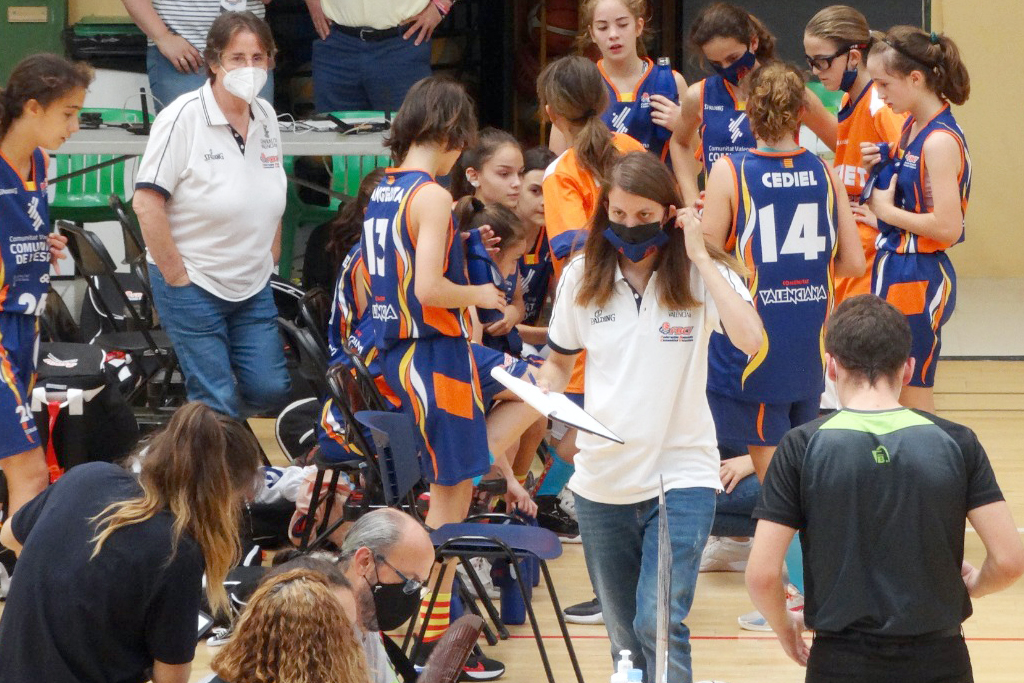
A more complex and different selection process than in other years
Miriam explained how the selection process works to develop the teams that will represent the Comunidad Valenciana. “Normally a call-up is made many months in advance, the so-called ‘Detection Days’, and clubs send players who they believe have the skills to be part of the regional side and a training sessions is carried out in which the coaches observe them and a first screebning is carried out“.
This year, unlike previous editions and due to the health emergency, the call-up was made on the days that would normally be used to prepare for the championship with an established side. “During the first day, a pre-list of 18 male and female players was made, based on reports already available to the Federation, and the following day, a separate identification process took place in Alicante, Valencià and Castellón. There were five different adapted training sessions, according to the number of registered by prvinde that served to perfect that initial list“.
From that group of 18, the coaches worked with them and, according to Miriam, new boys and girls were added during this process after restrictions were relaxed and the sports centres were once against hosting the public. “It was then that we resumed our work of going to watch games and scout for possible candidates“.
Finally, several weekend training sessions were held and a final selection of 15 players were chosen of which 12 would attend the championships and three would remain in reserve.
In this edition, the coaching staff in which Mirian participated was made up of a coach, assistant coach and an assistant-delegate for both the make and female sides. In addition, there was a physiotherapist and a doctor who attended to the needs of both teams. In Cádiz, they were also supported by the sports director, the president of the Federation and three national level referees.


